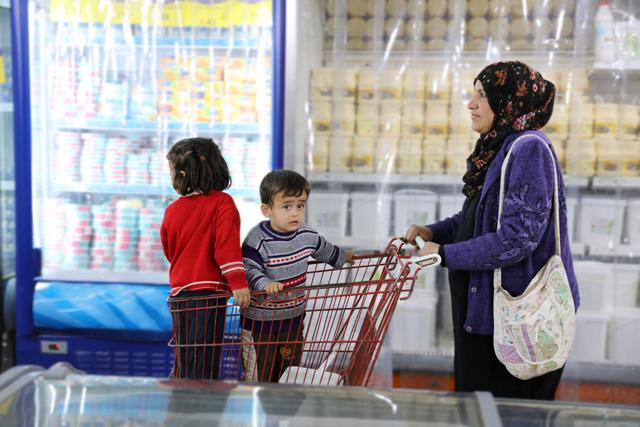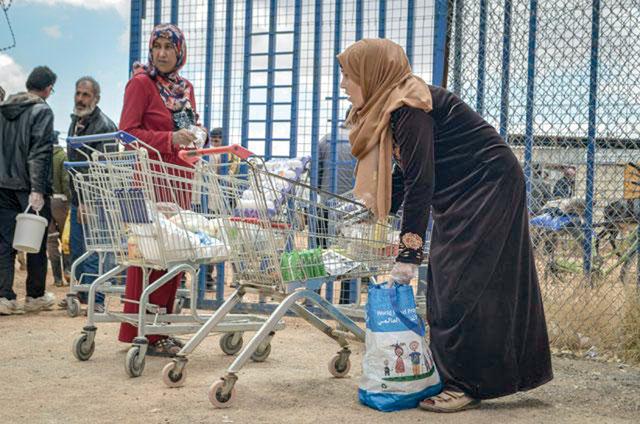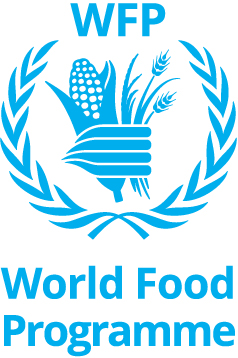You are here
21,000 Syrian refugees will not get critical food aid this month — WFP
By Batool Ghaith - Jul 07,2021 - Last updated at Jul 07,2021

World Food Programme’s assistance is a lifeline for refugee families (Photo courtesy of WFP/Mohammad Batah)
AMMAN — The United Nations World Food Programme (WFP) stated that 21,000 Syrian refugees in Jordan will no longer get their monthly food aid this month due to funding shortages.
The organisation urgently needs $58 million to continue food assistance until the end of the year for the half million refugees under their care, according to WFP.
A recent WFP survey revealed that 68 per cent of the refugees have witnessed a decrease in their income since the beginning of the pandemic.
Food insecurity among refugees in Jordan has doubled over the last year, reaching 25 per cent; two in three refugees (64 per cent) are on the edge of food insecurity, WFP stated.
Dara Almasri, WFP’s communications officer, indicated that the socioeconomic impact of the pandemic on donor economies has made donors prioritise their own response and recovery.
Almasri noted that the needs from other regional crises, such as in Yemen and Syria, have also made it difficult for WFP to raise the necessary funds to maintain the level of assistance it provides to refugees in Jordan.
“WFP has already been forced to stop assistance for 21,000 vulnerable refugees due to funding shortages, and without sustainable resources, we will not be able to re-include them in our food assistance programme. WFP needs $58 million in funding by September 2021, and without further contributions from donors, we will be forced to stop the monthly food assistance for another quarter of a million refugees in Jordan,” Almasri told The Jordan Times during an interview over the phone.
More than 80 per cent of refugees live outside of refugee camps, while the rest live in Zaatari and Azraq camps. WFP supports more than a half million refugees every month with cash assistance to meet their food needs, Almasri said.
“The refugees receive the assistance through cash-based transfers so they can buy their food; giving them more choice and a sense of ownership for their money,” she continued.
WFP is currently working with the Jordanian government, UN agencies and donors to raise enough funding in order to continue supporting vulnerable refugee populations in Jordan, according to Almasri.
Almasri added that WFP’s assistance is a lifeline for refugee families. “Eighty-three per cent of refugee families consider WFP’s food assistance as their main source of income, while 16 per cent of families do not have any other source of income to meet their basic needs. The consequences of cuts in our assistance will be dire, especially when families have lost their ability to earn money given the lack of work with the COVID-19 pandemic,” Almasri explained.
Almasri called on the international community to provide more funding to support the vulnerable refugee families, “There is no solution other than more funding; if we do not get the funding we need, people will go hungry,” she said.
Almasri pointed out that WFP is working with the government, NGOs, UN agencies and the private sector to help link refugees to the job market, “but cash assistance remains a lifeline for these refugees, and we hope that we can find solutions as soon as possible,” she added.
Hussein Al Jasem, a Syrian refugee living in the Maan Governorate, is one of the refugees who may lose his food assistance. Jasem has a family of eight children who depend on his support.
Jasem’s eight daughters, the oldest who is 10 years old, suffer from various health issues. The daughters need not only need food assistance but health assistance as well.
According to Jasem, they have no other source of income and so fully depend on WFP’s assistance to pay rent and buy the essentials. “I have a problem in my back and I am not able to work. We are already suffering as the assistance is barely enough to cover our basic needs, we live in a very small house and it is in a bad condition,” Jasem told The Jordan Times over the phone.
Jasem expressed his fear over the funding cut, saying that him and his family would end up “suffering to death” if they do not receive assistance.
“My daughters suffer from malnutrition, we mostly only eat eggs and potatoes and it is not enough. My eldest daughter has Bacteremia, and my other daughters have different health problems as well, my wife does not have a job either as she has to take care of our sick daughters,” Jasem explained.
He called on the government and UN agencies to help him and his family move to a camp or a better house, and to provide cash assistance to cover his rent and family’s health treatments.
“We have been in Jordan for the past seven years,” Jasem said, “I hope that the Jordanian government and UNHCR can help my family and I live a better life, we are in a very bad condition and we need all the help we can get.”
Related Articles
AMMAN — The United Nations World Food Programme (WFP) in Jordan on Monday welcomed a timely contribution from the government of Canada that
AMMAN — The United Nations World Food Programme (WFP) announced that 21,000 Syrian refugees will no longer receive their monthly food assist
AMMAN — The United Nations World Food Programme (WFP) and the government of Germany jointly announced a vital step in ensuring the continuit

















